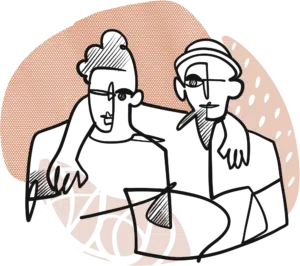
Twos are generous, supportive and caring. They have the drive to make the people around them feel loved and comfortable. It’s why they are called helpers and givers. Twos readily offer whatever they have: their time, their attention, or simply a bowl of hot soup. They love to feel involved in the lives and needs of the people around them.
It’s often hard for Twos to respect their own boundaries and openly ask for the things they need. Twos tend to pretend that they don’t have any needs of their own until they become resentful as a result of feeling like no one cares for them.
Twos are warm and affectionate people with a lot of energy, which they invest into the people they love. For Twos, everything is relational. They view the world through the needs and desires of other people, having super fine antennas to pick up other people’s needs and what they can do to meet them.
It’s not hard for Twos to be popular with many people, because they make them feel cared for and accepted. What most people don’t know is that the Twos in their lives are often giving much more than they should while pretending to be a-ok. Twos take pride in being-there for others, but they have a hard time acknowledging that someone needs to be there for them, too.
Twos want to be needed. Other people needing them reassures them of their self-worth. For Twos, being loved and appreciated depends on making yourself indispensable to others.
Twos are part of the “heart group“ of the Enneagram, together with Threes and Fours. All three types have a special relationship to shame and their sense of self-worth. Threes are afraid they aren’t worthy of love if they don’t perform exceptionally. Fours long to be authentic and unique. Twos try to get love and acceptance from giving themselves up for others.
As children, Twos pick up the message that expressing their needs isn’t okay. So they try getting their needs met by asking for them indirectly – through the things they do for others. They are often very eager to help their parents and willing to take on extra projects at school. With their highly sensitive social antennas they tend to have many friends, but they tend to give up their own wants and desire to please those they want to be close to.
Twos (unconsciously) believe that having and expressing your own needs is selfish. So in order to get their needs met, they revert to a strategy of “giving in order to get”. Twos fear that if people don’t need them anymore, they will leave them. Their sense of self-worth is therefore based on how other people respond to their generosity and self-sacrifice.
The helpful and friendly nature of Twos can become suddenly aggressive and demanding when they become too worn out by being there for everyone else all the time. In these moments, the hidden pride of Twos a of how special they are in the lives of others appears, and they can turn to open or subtle means of manipulation to get what they want.
Healthy Twos, who find their self-worth outside of what they do for others, are able to find a healthy balance between giving and taking. They are comfortable with caring for themselves and asking others to do the same. They create places of warmth and safety for many, but not from a place of submissiveness, but of strength and truly selfless love.
The most important message for Twos is that they are loved and worthy of love just by being themselves. That having wants and needs is normal, not selfish, and that they won’t get rejected by expressing them.








Your personality isn’t a fixed thing. People grow. While we don’t change our basic personality, we all can become more mature and healthy inside our personality. But at times, we also revert to less healthy behavior. This looks different for every personality type. Let’s see how it unfolds for Twos.
On average levels of psychological health, Twos focus most of their energy on others: their family and loved ones, their colleagues and friends. They get a lot of appreciation for the things they do for others, which is what keeps them afloat throughout the day. When they get exhausted, they tell themselves that it’s better to make other people happy by giving them what they want than appearing selfish. But from time to time, there can be frustration from the feeling that people take them for granted, while in fact the Two simply hasn’t been able to tell anyone what they actually need.
Psychologically unhealthy Twos become more manipulative to get their needs met. They start to “give” where no one asked them to in the hope of getting a response. Unhealthy Twos like to play the martyr who always sacrifices themselves without anyone ever caring for them. Their relationships can become co-dependent, trying to keep people dependent on them, even if it harms them or keeps them unhealthy. Their fear of appearing selfish actually makes them more selfish.
Healthy Twos have found their self-worth inside themselves and outside of what they are to others. They lose their fear of losing relationships by asking for what they want. Their boundaries become healthy, and they’re able and willing to defend them. They also know what’s theirs to do and what is not. They can accurately discern when it’s their turn to offer help and when it is someone else’s. Healthy Twos are able to achieve both of their innermost desires: To be loved and to be truly selfless.
The idealistic Type One wing makes Twos more disciplined, focused and reflected. They become more comfortable with holding themselves back and become more idealistic themselves, having high standards for their work ethic, their personal conduct and the behavior of others.
With a Type Three wing, Twos become more ambitious and competitive. It’s easier for them to share who they are, be in the spotlight and tell people directly what they want and what they have to offer in return. Their image becomes more important to them, not just in what they are doing for others, but also in what they accomplish for themselves.
It’s not unusual that people are not sure which Enneagram personality type they really are. If that’s you, don’t worry, it’s totally normal. The Enneagram doesn’t just look at your behavior, but at the motivation behind your behavior. This means that some Types can look similar on the outside.
What happens most often for Type Twos is that they get confused with Types Six and Eight. Sometimes, they also mistype themselves for Sevens and Nines.
Since every type has two wings, you might also be unsure whether Type One or Type Three, your wings, might actually be your main type.
You can learn how to safely tell Type Two apart from all the other Enneagram types here.
Finding out about your Enneagram type shouldn’t be the end of your journey of discovering your personality. The Enneagram is an amazing tool to help you on your journey to become more self-aware and self-accepting.
These five ideas are only a first step to get you started. Get your premium profile to find out much more about how you can use the Enneagram to become your healthiest self!
You are a master of figuring out what others need from you before they even open their mouth. Most other people however don’t possess that special skill. But they are happy to help you if you tell them clearly what you need. Try telling them directly instead of hinting at it, hoping that they get it (and being frustrated when they don’t).
Not everything people ask you to do is actually yours to do. Yes, it feels good to see the smile on their face after you help them. But it’s not worth the exhaustion and neglecting your own needs. Defending your boundaries is a job only you can do.
It’s okay that not everybody likes you. Catch yourself when you’re pushing too hard to present a likeable image or use flattery to win people’s approval. There are plenty of people out there who will like you just as you are.
Ask yourself at least once a day: What are my emotional needs right now? Are they being met? Am I expecting others to meet them for me, or do I need to attend to them myself? You are a master of compassion. Don’t be afraid to use it on yourself.
Helping others is beautiful in and of itself. Remember that it loses its purpose when it’s only done to reinforce your importance in other people’s lives. Be careful to not misuse their gratitude to compensate for a deeper fear of being unlovable.
Cool cool cool
well, I knew some of these things about myself and I often feel misjudged by others that don’t know the motivations behind my actions. This teat and results help me understand why.
My score is me to a tee! I will read more of this to learn how to be a better me, for myself and others.
Thank you!
I have taken dozens of personality tests over the course of my 43 years. This one has been the strongest and most helpful. Thank you!
To be candid I don’t know anything about Enneagram before now. Thanks for this exposure and educative post.